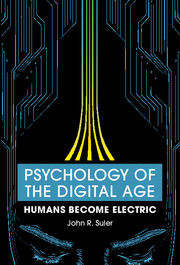Book contents
- Frontmatter
- Dedication
- Contents
- List of Figures
- Foreword
- Preface
- Acknowledgments
- Introduction: Newborns in Evolution
- 1 Cyberpsychology Architecture
- 2 Presence: Be Here Now
- 3 The Dynamic Digital Psyche
- 4 The Disinhibited Self
- 5 Electrified Relationships
- 6 Other Than You Think: Interpersonal Perceptions
- 7 Text Talk
- 8 Image Talk
- 9 I, Avatar
- 10 One of Us: Groups and Communities
- 11 Change and Excess
- 12 Addicted or Devoted
- 13 The Digital Deviant
- 14 Synthesized Realities and Synthesized Beings
- 15 Electric Th erapeutics
- Conclusion: Research and the Researcher
- References
- Index
7 - Text Talk
Published online by Cambridge University Press: 05 November 2015
- Frontmatter
- Dedication
- Contents
- List of Figures
- Foreword
- Preface
- Acknowledgments
- Introduction: Newborns in Evolution
- 1 Cyberpsychology Architecture
- 2 Presence: Be Here Now
- 3 The Dynamic Digital Psyche
- 4 The Disinhibited Self
- 5 Electrified Relationships
- 6 Other Than You Think: Interpersonal Perceptions
- 7 Text Talk
- 8 Image Talk
- 9 I, Avatar
- 10 One of Us: Groups and Communities
- 11 Change and Excess
- 12 Addicted or Devoted
- 13 The Digital Deviant
- 14 Synthesized Realities and Synthesized Beings
- 15 Electric Th erapeutics
- Conclusion: Research and the Researcher
- References
- Index
Summary
There is creative writing as well as creative reading.
– Ralph Waldo EmersonI had been wandering around the Internet for a while, but this was my first time in America Online (AOL). I sat back and wondered what I should do there first. There were all those discussion boards devoted to topics that I enjoyed, such as psychology, of course, but also Eastern philosophy, martial arts, and music. But maybe the first thing I should do was send an email to my friend and colleague Rick, the only person from my real life who was also online. AOL was easy to use, but I wasn't exactly sure how to compose my message. Like a regular postal letter? I told him how I had decided to join America Online, that this was my first email, and I clicked the Send button. About half an hour later, he replied, welcoming me aboard. Amazing! I had just carried on a conversation with a friend using mail, but without envelopes, stamps, the U.S. postal system, or a delay of at least several days. It was all happening inside my computer, right now, inside this thing called “cyberspace.”
A NEW KIND OF RELATIONSHIP
In the course of human history, the written word emerged as a powerful technique for communicating across distances. In addition to books and other types of manuscripts, personal letter writing between individuals dates back to antiquity. Publishing houses and modern postal systems expedited text communication, but the advent of the Internet raised the game to a whole new level. Not only did cyberspace enable more people to communicate using text quickly, efficiently, and across time and space, it also led to unique styles of talking among individuals and groups. Some researchers refer to it as text speak or computer-mediated communication, while I prefer the term text talk because it implies both an individual's attempt to communicate as well as conversation among people. More so than ever before in human history, we have entered a prolific age of text-driven relationships, even though we now take it for granted. For these reasons, I include text in its own category as one of the eight dimensions of cyberpsychology architecture, and have devoted this chapter to it.
- Type
- Chapter
- Information
- Psychology of the Digital AgeHumans Become Electric, pp. 158 - 193Publisher: Cambridge University PressPrint publication year: 2015



